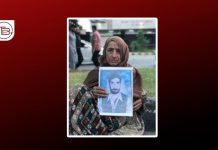On the first day of Eid Al-Adha, widespread protests took place in Quetta and Gwadar as families of missing Baloch individuals rallied to demand the recovery of their loved ones. The demonstrations were organized by the Voice for Baloch Missing Persons in Quetta and the ‘Haq do Tehreek’ in Gwadar.
Participants from various backgrounds – relatives of the missing, political parties, student organizations, and others – gathered in large numbers at these protests. They held photographs of the missing individuals and placards demanding an end to forced disappearances and fake encounters in Balochistan.
•Quetta Protests Amidst Eid Festivities
On the first day of Eid Al-Adha, a large rally was organized in Quetta, protesting against enforced disappearances and advocating for the recovery of the missing individuals. Simultaneously, a protest took place in front of the Quetta Press Club, bringing these urgent issues into sharp focus.
The festive atmosphere of Eid Al-Adha was replaced by emotionally charged speeches. Dr. Hakeem Baloch, President of the Baloch People’s Congress, addressed the crowd, painting a picture of a long-standing fight for freedom and rights.
He noted that the Baloch people, after a gruelling struggle of 75 years, find themselves at the peak of their movement. Despite betrayals from those in power, the Baloch remain committed to their resistance movement and will stay steadfast towards their objective.
•Balochistan’s Eid: Celebration Meets Sorrow
The celebratory mood of Eid was overshadowed by placards depicting images of the ‘missing’ and slogans against forced disappearances and fake encounters. Families shared painful accounts of their experiences, underlining the psychological toll these disappearances have had.
•Gripping Accounts from Family Members
At the rallies, several relatives of missing persons shared heartrending accounts of their experiences. Among them was the mother of missing student leader, Zakir Majeed, who has been awaiting her son’s return for fourteen years. She remarked, “The state, by making our children disappear and inflicting oppression on us, will one day face this oppression itself.”
Saeeda Baloch, a relative of two forcibly disappeared individuals, Zahoor Ahmed and Sajjad Ali, poignantly depicted the contrast between festive Eid celebrations and their protest. “While the children buy bangles and celebrate, families of the disappeared are marking Eid on the streets holding banners for their loved ones,” she said. “If you ask who Shari and Sumaiya were who carried self-sacrificing attacks, they were sisters like us whom the state forced to the extent that they did not hesitate to give their lives,” she added.
The mother of missing Jahanzeb Baloch, speaking at the protest rally, said, “For the past eight years, I have been pleading for my son’s recovery in courts, commissions, and everywhere else, but no one listens to us. There is no one for the Baloch in this country except for these missing families who are on the streets of Karachi and Quetta with their sorrows.”
A relative of the missing Rashid Langov added, “If today we didn’t have these photos, we sisters would have forgotten the faces of our loved ones after all these years.”
•Gwadar: Echoes of Quetta’s Protest
Similar to Quetta, Gwadar hosted a significant protest rally on the first day of Eid, organized by the ‘Haq do Tehreek’. Speakers emphasized that if the forcibly disappeared individuals were suspected criminals, they should be legally processed instead of being made to vanish. They voiced opposition to the CPEC (China Pakistan Economic Corridor), alleging it was being built on the sacrifices of their children.
The protest saw significant participation from women, children, relatives of the missing, and local political party leaders, all united in their demand – the immediate recovery of their missing loved ones.






























